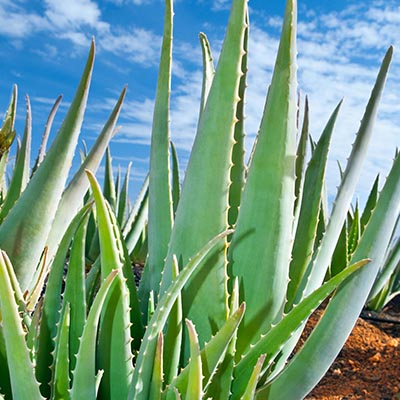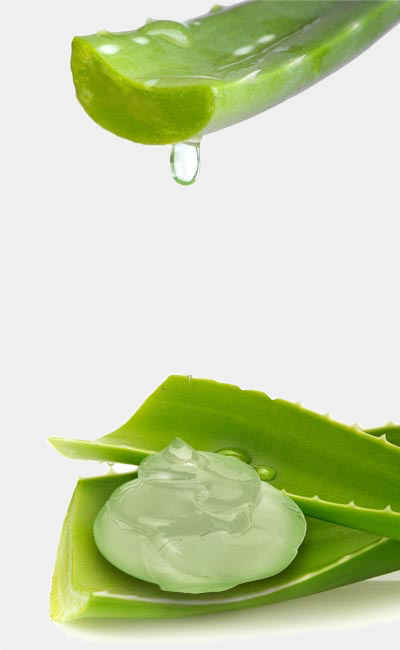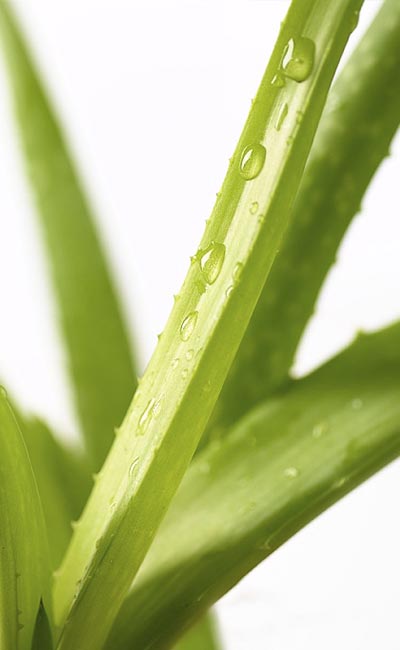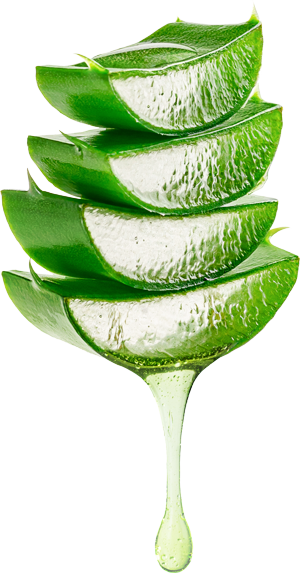Handbook
Aloe Vera is a natural functional ingredient that enhances and supports wellbeing and vitality.
Aloe / Bioavailability
The commonly accepted definition of bioavailability is the proportion of the nutrient that is digested, absorbed and metabolized through normal pathways.
It is not enough to know how much of a nutrient is present in a dietary supplement; the more important issue is how much of that present is bioavailable. A common belief regarding bioavailability of dietary supplements is that they have to be in solution to be absorbed in the body. As the majority of the vitamins and supplements that we consume are flushed out of our system before we are able to absorb them fully, Aloe polysaccharides are considered the main biologically active component of Aloe that helps enhance nutrient absorption.
The overall effectiveness of Aloe Vera on promoting health in the human body is hugely dependent on the polysaccharides found in Aloe Vera as it can boost your sales of a new class of dietary supplements. Aloe Vera can be a convenient composition containing very broad-spectrum, 100 % natural, organic, plant macro and micronutrients.
Aloe Vera can be incorporated to any formulation as a nutritive additive into various oral, capsules, tablets, gel caps, and parenteral delivery methods such as in waters, beverages, foods, herbal, natural or dietary supplements. Fundamentally, in many countries throughout the globe, botanicals are the first choice in preventative health, and the costs are not just monetary. Conventional healthcare is costly both monetarily and in many, depressed quality of life results due to side effects.
Aloe Vera consumption Increases Vitamin Bioavailability
Recent research, sponsored by the International Aloe Science Council (IASC), concluded Aloe Vera increases levels of vitamins C and E in the bloodstream by more than 200 % when consumed. The study also concluded Aloe Vera can enhance the bioavailability of both water- and fat-soluble vitamins, and has a natural time-release effect (vitamin levels were found to remain elevated for 24 hours, according to the study). Like Aloe, vitamins C and E are known to be powerful antioxidants that boost immune system function, promote skin health, and protect cardiovascular health. The bioavailability research has created a landmark event and major turning point for the functional food and nutraceutical industry as these companies realize the benefits of incorporating Aloe Vera into their products containing vitamins C and E.

Aloe Vera gel enhance the bioavailability of vitamins C and E in humans, and also is able to significantly reduce transepithelial electrical resistance (TEER) of Caco-2 cell monolayers and also significantly enhanced the transport of insulin across this cell culture model. The transport enhancement effect of Aloe Vera materials is probably due to the opening of tight junctions to allow paracellular transport, Aloe Vera’s polysaccharides contributes on their drug absorption enhancing properties. The effect of Aloe Vera on the oral bioavailability of vitamins C and E was investigated in humans in a randomised, double-blind, cross-over clinical trial. Both the gel and aloe vera gel extract decreased the rate of vitamin C absorption, but the overall bioavailability (area-undercurve) of vitamin C was 3 times higher when administered with the Aloe gel as compared to the control and the gel kept the level of this vitamin significantly higher (p ≤ 0.05) than the Vaseline even after 24 hours. The mechanism of action of the Aloe products to improve the bioavailability of the vitamins was explained to be a possible protection effect against the degradation of the vitamins in the intestinal tract as well as binding of the polysaccharides to the vitamins and thereby slowing down the absorption rate. Many potential therapeutic agents face the disadvantage of low bioavailability after oral administration due to poor membrane permeability. Drug absorption enhancers are compounds capable of reversibly removing the resistance of the outer layers in the body with minimum tissue damage, thus allowing the drug to enter the blood circulation in sufficient quantities.

Aloe’s polysaccharides contribute on drug absorption, enhancing properties
One function of epithelial cells is to maintain distinct compartments within the body and also to act as barriers to separate the body from the external environment. Although molecules can cross the intestinal epithelium by three main pathways, namely transcellular passive diffusion, paracellular passive diffusion and carrier-mediated transport, many useful drugs exhibit poor absorption after oral administration.
Poor drug absorption across the intestinal epithelium is in many cases attributed to unfavourable physico-chemical properties of the drug molecule such as hydrophilicity and a large molecular weight. The intestinal absorption of these drugs can be increased by different techniques such as co-administration of absorption enhancing agents. Absorption enhancing agents may facilitate the absorption of poorly absorbable drugs by different mechanisms such as opening of tight junctions or changing the membrane structure or targeting transporter proteins.
Only limited information is currently available on the drug absorption enhancement activities of Aloe vera gel, but if it proves to be a safe and effective absorption enhancer in vivo, it could be used in novel dosage forms for the oral delivery of poorly absorbable drugs that are administered by means of injections.
Aloe Vera monosaccharides and polysaccharides
Monosaccharide and polysaccharides have anti-inflammatory, antibacterial, antiviral, anti-mycotic and immune-stimulating effects. These properties enhance digestion, bind numerous detrimental substances such as cholesterol, and gall acid. Most importantly are the long-chain sugars (especially the polymannan sugars) which enter the intestinal wall undegraded and then have an immune regulating effect in the blood. On the other hand, they stick to the intestinal wall and therefore prevent undesired substances from entering the bloodstream. The most important ingredient is the acemannan, which cannot be produce by adults. It supports the immune system, is anti-inflammatory and bolsters the digestive system in its absorption of vital substances. The following substances belonging to this group were found in Aloe Vera Gel: Acemannan, aldopentose, arabinose, cellulose, galactose, galacturonic acid, glucoronic acid, glucose, hexanoic acid, mannose, mannuronic acid, pentosan, rhamnose, uronic acid, xylose.
Aloe Vera polysaccharides enhance your formula
Polysaccharides, now more commonly called glycosamino-glycans, are a special form of polysaccharide. They are made in the human body and perform many key functions in our health, including promoting growth and enhancing the immune system. Unfortunately, after puberty we cease manufacturing these polysaccharides and must obtain them from outside sources. Formulate with Aloe Vera to deliver these polysaccharides to your customers. We all know how exhausting it can be living an active, busy lifestyle. Aloe Vera is your solution in nutraceutical ingredient, to boost your vitality due it is very rich in various nutrients. These nutrients help Aloe Vera nourish and enhance immunity.
Aloe Vera is nutrient dense, meaning they contain a broad-spectrum of synergistic concentrated beneficial macro and micro nutrients that help or enhance the body’s abilities to generate healthy cells and maintain optimum operational performance. Aloe is a great carrier increasing bioavailability of other compounds. The great success of Aloe as a commodity for use in nutritional foods and cosmetics is due to the proper stabilizing procedures that enable processors to store and ship the Aloe Gel without fear of spoilage throughout the market places of the world. Aloe provides a unique form of low molecular weight polysaccharides, as we age, our bodies produce less and less energy and fill with stress, and allow have low defense in the body.
Aloe Vera is a very well-known adaptogen.
An adaptogen is something that boosts the body’s natural ability to adapt to external changes and resist illness. It is thought that Aloe’s power as an adaptogen balances the body’s system, stimulating the defense and adaptive mechanisms of the body. This allows you an increased ability to cope with stress (physical, emotional and environmental stress like pollution). Aloe Vera’s most extraordinary property, the ability to act appropriately on the specific problem or problems of the person using it. People taking Aloe Vera for one problem are often surprised when it handles something else.
Immune modulation of Aloe Vera gel.
Carbohydrate-based immune adjuvants are capable of enhancing the vaccine against various infectious disease. Several natural polysaccharides originating from plants and microbes have been tested for their adjuvant potential. Adjuvant potential of plant polysaccharides mainly depends upon their solubility, molecular weight, degree of branching and the conformation of carbohydrate structural backbone. Aloe polysaccharide or acemannan as an adjuvant may interact and activate various toll-like receptors and inflammasomes, involving several innate immune system players in the ensuing immune response. Aloe polysaccharide or acemannan plays critical roles in immune system function and has strong safety and torelability records and is readily biodegradable.

Download full Aloe Vera Handbook
“disclaimer” that FDA has not evaluated the claim. The disclaimer must also state that the dietary supplement product is not intended to “diagnose, treat, cure or prevent any disease,”because only a drug can legally make such a claim.

